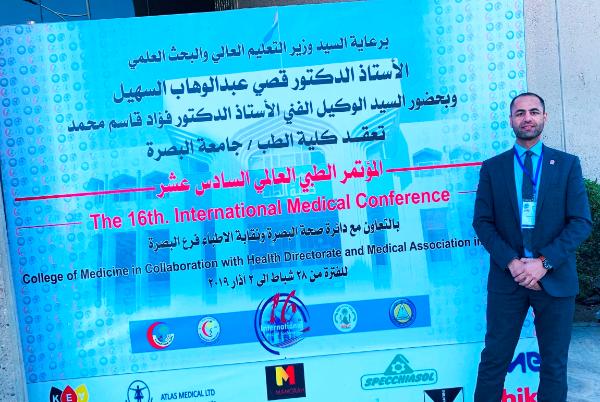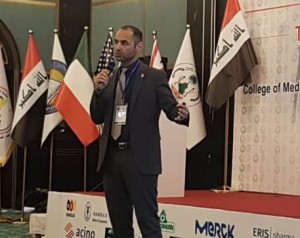Please note, this page has been archived and is no longer being updated.
A Swansea University lecturer has been sharing his expertise to help improve medical care in his homeland of Iraq.
Gastroenterologist Dr Laith Al-Rubaiy, a Senior Clinical Lecturer at Swansea University Medical School, he has just returned from a trip back to Basra, where he trained, where he addressed an international conference.
He is now working with authorities in Basra to implement action points to improve healthcare and medical training.

Dr Al-Rubaiy first came to the UK in 2005 and now combines his teaching role at Swansea with hospital work in London. But he has also been putting his expertise to good use volunteering as with the AMAR Foundation which provides medical treatments to some of Iraq’s poorest citizens.
His dedication to his homeland has led to him being nominated for a prestigious St David Award, which celebrate the exceptional achievements of people from all walks of life in Wales and abroad. Shortlisted in the international category, he will find out if he has been successful at a ceremony in Cardiff tomorrow.
Dr Al-Rubaiy said: “At the Basra conference I presented my experience with the cancer screening programmes in UK for bowel and liver cancers to help transfer knowledge and learned lessons to my Iraqi medical colleagues.”
 The event, organised by Basra College of Medicine, was attended by more than 300 delegates including academics and universities across Iraq.
The event, organised by Basra College of Medicine, was attended by more than 300 delegates including academics and universities across Iraq.
“I was very impressed by the quality of the studies and scientific discussions workshops held during the conference.
“Iraq went through difficult decades of wars, sectarian conflicts and financial sanctions but today medical education and training in Iraq continues its confident strategic plan to shape the future of medical education in Iraq with optimism,” he said.
He explained that a second medical school in Basra has been launched to meet the demand for doctors in Basra and southern Iraq and Dr Al-Rubaiy is already planning his next trip back in October to support further training.
He said: “I have been asked to give lectures to emergency department medical staff about the managing acute medical emergencies and help them in developing local A&E guidelines and audit.
“I have already built links with Basra Medical College and we are hoping to develop a future mutual agreement to share and exchange knowledge and expertise.”
He added: “Basra is a vibrant city that deserves to be visited and I have nothing but respect to Iraqi doctors who continue to defy the odds and carry on with their medical research.
“There is still a huge amount of work to be done, and Iraqi doctors need all the help but if this positive momentum continues, it will not be long until Iraqi medical education system, that once was the best education system in the region, resumes its full potential.”
- Wednesday 20 March 2019 15.02 GMT
- Wednesday 20 March 2019 15.00 GMT
- Press Office, Tel: 01792604290
